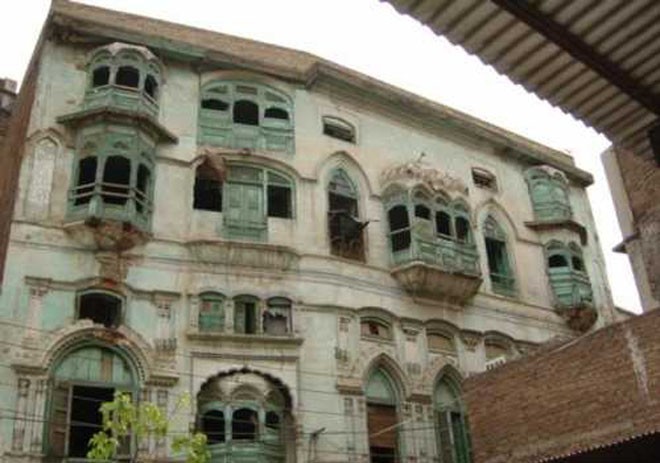
Will the Prithviraj Kapoor house be demolished being declared unfit to live or the government make a move for its restoration?

The bad news is that the house where Raj Kapoor was born has been partially demolished and the good news is that the demolition was halted after some furore in the media.
But what next? Will the house be demolished being declared unfit to live or that some other move will be made to keep it as it is or a move made for its restoration?
The last option is what the previous government of the Awami National Party decided when it was in power. The house where Dilip Kumar was born was also listed as one that was to be preserved as some kind of a tribute to the actor who has made the Peshawarites so proud. Probably since the current owners were demanding an exorbitant compensation for the two properties, the deal was either stalled or shelved altogether.
In Pakistan, there has been a raging conflict as to what is ours and what is not. Many have gone on this cultural cleansing crusade to claim that the land and its past should be eradicated of all non-Muslim symbols, signs, allusions and references. Initially, these zealots connected themselves to Iran, then to the Turco Mongol Afghan past, and of late are claiming a heritage hotline with the Arabian Peninsula. To them, history does not really matter nor does the land but it did matter to Dilip Kumar. He moved away from Peshawar to Bombay and did not have a chance to come back to the city of his birth almost for fifty years till the 1980s.
Then he came and went to see the house off Kissa Khawani Bazaar where he was born. When back in Bombay, he heard that another son of Peshawar, Raj Kapoor, was seriously ill and in hospital. He drove straight from the airport to the hospital, sat there for a while holding the hand of Raj Kapoor, whispering in his ear that he had been to Peshawar, communicating to him the feel of the city and the experience that he had been through.
It was not that Raj Kapoor was listening. He was in a state of coma and died soon after, but this signified the importance that both men held for the place of their birth. It is not a matter of choice but some kind of a bind from which there is no escape. The pristine connection with those close to you and the physical space that opens the doors of your consciousness in the post-natal phase cannot be substituted and carries a weight like no other experience does. It is an asset to a place, city or a village to own and recognise the sons and daughters who go on to make a name for them and offer something to humanity.
The family of Shahrukh Khan, another superstar of the cineworld, also belongs to Peshawar. His father moved away probably to Delhi just before partition, in search of greener pastures. He did not come back to the land of his birth, got married and had a son who was to shine across the firmament of cinema. The extended family, uncles, aunts and the cousins of Shahrukh Khan still live in the city of Peshawar and are known primarily because one of them shot to stardom in Mumbai (Bombay).
If not the country, at least the city is proud of its sons and daughters. The 98 year old house built in Dhakki Munawwar Shah by Dewan Basheshwarnath Kapoor, father of Prithviraj Kapoor, grand father of Raj Kapoor, Shammi Kapoor, Shashi Kapoor, great grandfather of Rishi and Randhir Kapoor and great great grandfather of Karisma, Kareena and Ranbir Kapoor can be preserved just as a humble payback to the happiness and pleasure that these stars have filled people’s lives with.
Dilip Kumar recalled in his autobiography "I am proud of my nativity in the then Indian city so strategically situated in the region between Central Asia and South Asia that it came to be known as the Gateway to India" and of the friendship between the police official Basheshwarnath Kapoor and his father, lovingly called Aghaji. The two often discussed the prospects that life offered, business matters and the many opportunities that were there in the faraway city of Bombay in those interwar period. He also recalled that Prithviraj, the debonair son of Basheshwarnath, also came to their house with the father and stunned the ladies with his handsome appearance. And since the business was not progressing satisfactorily, Aghaji decided to go to Bombay. As the prospects brightened, he called the family over probably by mid 1930s.
Prithviraj’s mother died when he was very young and so the father remarried. Prithviraj was sent to his maternal grandparent in Samundari from where he returned home when slightly older. In Peshawar, he was looked after by his phoophi (paternal aunt) Kaushalya Bua who was also sympathetic to his aspirations. He had a taste of theatre when Professor Dayal, incharge of the Dramatics at the famous Edwards College, spotted talent and cast him in Dina Ki Baraat, originally a Punjabi play by R.I. Sahni. He was further cast in Spreading the News by Lady Gregory and Riders to the Sea by J.M. Synge.
Prithviraj was married at the age of 17 but he wanted to go to Bombay to be an actor. The father was furious and shouted at him but fully determined and supported by Kaushalya who gave him Rs75, he left Peshawar in 1928 to sneak to Bombay, only to send for his wife and children later.
After partition, the remaining part of the family left the house and the city of Peshawar. Shashi, Randhir and Rishi Kapoor also visited the house once and carried a handful of soil from the compound of the house with them to Bombay.